Owen Fernandez, a farmer in Baihua Village, Honduras, introduces the flavor characteristics of washed Pacas coffee.

Owen Fernandez, Baihua Village, Honduras
This coffee comes from Las Flores in Santa Barbara, Honduras. Baihua Village is famous for its unique flavor due to its microclimate and the evolution of different varieties.
The mountains of Santa Barbara are steep next to the primeval forest, and the rainfall is particularly unstable. In several nearby villages, apart from Baihua Village, El Cedral Village and EL Cielito Village are always victorious in the Outstanding Cup, and the local endemic variety Pacas (Pacas) is a special bean grown in Central America.
Owen Fernandez (Olvin Fernandez), a farmer in Baihua Village, is the son of the Fernandez brothers and the son of an old farmer, Florencia Paz I, who has worked in the coffee field since he was young.
He recalls that in the past, he and his father mainly grew commercial beans. They were not familiar with the varieties and methods of coffee, nor did they know what varieties they were growing on their farm. They only wanted to increase their production.
Later, with the help of the local washing plant, I gradually learned that the market for tasty coffee requires that the farm be more strict in planting and pay more attention to its quality.
After the improvement of quality, Fernandez achieved excellent results in the Super Cup, fifth in 2010, runner-up in 2011, 11th in 2014 and so on.
The farm near Santa Barbara is very small and every step mule is strictly controlled. After the fresh fruit is harvested by hand, the immature fruit is separated from the ripe fruit. The coffee is peeled, fermented for 12 hours, washed and dried on an African drying bed in the greenhouse for 15 days.
The farm where Owen and his brothers work, with very little output, is a standard micro-batch, directly traded in Right Side bakeries in Spain.
Pacas
The Pacas variety originated in El Salvador and is a natural variety of Bourbon. The natural varieties of Bourbon include Kaddura in Brazil and Verasac in Costa Rica.
Due to a single gene mutation, Pacas's plant is smaller than the average bourbon, and the farm can plant the short Pacas intensively to increase the yield of fresh fruit.
Pacas was discovered in 1949 at the Pacas family farm in the Santa Ana producing area of El Salvador, which was then selected by the Salvadoran Coffee Institute and became an important coffee variety in El Salvador, with an estimated yield of about 1%.
Pacas is a variety of bourbon, and many agronomic characteristics are very close to bourbon, such as green leaves, small bean shape, medium grain yield, and no resistance to diseases and insect pests, especially leaf rust. The biggest difference is that the plant is shorter and compact, and the average yield is higher.
The Salvadoran Coffee Institute mixed Pacas with elephant beans to develop the Pacamara, but both Pacas and Pacamara, like their parents Bourbon, had no resistance to leaf rust, which swept Central America in 2012 and caused terrible losses to farmers in El Salvador.
Through the Central American Coffee Cooperation Program, other countries have also introduced Pacas, and the IHCAFE of Honduras was introduced in the 1970s. According to Right Side Bakery in Spain, Pacas, who moved to Honduras, is even better, showing tropical fragrance, dry scent, a high degree of complexity, and very close to the flavor spectrum of African beans.
Owen Fernandez Pacas, Honduras, all washed.
Honduras Olvin Fernandez Pacas fully washed
■ producer: Honduras, Honduras
■ bean seed: Pacas Pacas
■ producing area: baihua Village Las Flores, Santa Barbara Santa Barbara
■ Farm: Mi Paz
■ producer: Owen Fernandez 0lvin Fernandez
■ altitude: 1520 m
■ treatment: full washing Fully Washed
■ flavor: pineapple, white wine, blackcurrant
Important Notice :
前街咖啡 FrontStreet Coffee has moved to new addredd:
FrontStreet Coffee Address: 315,Donghua East Road,GuangZhou
Tel:020 38364473
- Prev

Producers of Lisa do Horala in Colombia introduce the source and flavor of washed pink bourbon coffee.
Lizardo Herrera Horara is the first time Lisa has exported boutique coffee because in the past few years, his batches have been rejected by several exporters. He knows very well how to go through the fermentation process to affect the flavor, so his coffee is more fermented than other Vera coffees. He thinks this is why most raw bean exporters refuse to accept his coffee.
- Next

Characteristics of Coffee in Brazil Coffee production area introduction and Flavor of Solar Datra Alamosa Coffee
Coffee flavor characteristics of Brazil Syracuse famous producing area of Brazil is located in the southern state of Parana and is famous for its exquisite quality. Hirado producing area (Cerrado Coffee Region) is about 1000m above sea level, with distinct dry and wet seasons, annual average temperature of about 21 degrees, fertile soil and rich minerals, so that the coffee beans can get adequate nutrition. It is unique among many producing areas in Brazil.
Related
- Beginners will see the "Coffee pull flower" guide!
- What is the difference between ice blog purified milk and ordinary milk coffee?
- Why is the Philippines the largest producer of crops in Liberia?
- For coffee extraction, should the fine powder be retained?
- How does extracted espresso fill pressed powder? How much strength does it take to press the powder?
- How to make jasmine cold extract coffee? Is the jasmine + latte good?
- Will this little toy really make the coffee taste better? How does Lily Drip affect coffee extraction?
- Will the action of slapping the filter cup also affect coffee extraction?
- What's the difference between powder-to-water ratio and powder-to-liquid ratio?
- What is the Ethiopian local species? What does it have to do with Heirloom native species?

